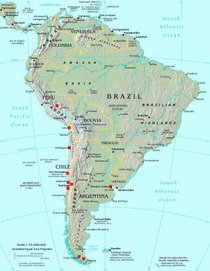Hamburg: Art, Opera, Harbors, Beaches, and Spices
On Saturday, we had basically the whole day free, so we decided to go to the Kunsthalle, or Museum or Art. Like the National Gallery in Washington, D.C., the museum had both old and modern art. Modern art is always more interesting to me, and they had a very large section devoted to it.
[Andy Warhol's Marilyn Monroe]
My favorite pieces were the video installations; a particularly interesting piece was a State of the Union address given by George Bush, where all the words were cut up and alphabetized. It was quite amazing how many times he said "Merica" and how simple his vocabulary was. The museum was quite extensive, and we ended up spending most of the day there.
[Me, Annie, Jessica and Casey before the Opera]
On Saturday night, we had tickets to the opera as a group. At the Hamburg Kammeroper, we saw a very modern rendition of Orpheus and Eurydice. The story is about a man who is so depressed after the death of his wife that he tries to go to Hades to rescue her. Along with other challenges, he is allowed to, as long as he does not look at her before they are out of hell. Of course, he cannot do this and ends up looking at her.
[The Kammeroper]
In the opera we saw, Orpheus does not go to hell, but rather gets high and has some sort of trip where he imagines seeing Eurydice. It would have been alright to see such a modern rendition, but it was also poorly staged. Almost all the action happened on the floor, and due to the seating, we could not see what was happening in the small theater from our seats.
[Group on the boat]
On Sunday, we got up early for a tour of Hamburg's harbor with the whole group. After a late start, our boat tour began. Although Hamburg has very pretty canals, they are somewhat hard to navigate because of the difference in the tide. So instead, our tour was of the large Harbor that Hamburg is known for.
[Chinese shipping boat]
For two hours, we heard about Hamburg's harbor. This meant we got details about how many ships come in, what they deliver, how they are transported, etc. There was very little about Hamburg as a historic harbor and more about it's modern day functions. This was of course, not what we expected and not what most people would have enjoyed.
[Part of the old harbor that is left, cranes that used to haul up goods. Hamburg was once a big port with spices and goods coming in from all over the world. The commercial sale is now mainly oriental carpets.]
After the harbor tour, we went to the "Spicy's Spice Museum." The only spice museum in the world, it talks about where spices come from, how they are extracted from plants, how the spice trade was run, why spices were important, and most importantly, has a whole section where you can taste and smell the spices.
[All different kinds of spices.]
[Everyone smelling the spices.]
It wasn't a very large museum, but it was really interesting to learn about the spices and where they come from. But best of all was really getting to experience all the spices.
[On the boat, which are part of public transportation, on the way to the beaches]
After the Spice Museum, the sun started poking out and we rushed over to Hamburg's "beaches" that lie along the river in hopes of enjoying the sun. However, by the time we got to the beaches, it was already cloudy again. We did have a good time watching the Germans on their Sunday walks though.
[Annie and I on the beach]
After the beach we headed to the infamous St. Pauli and Reeperbahn, since we had been told it was one of the sights to see in Hamburg. St. Pauli is the biggest red-light district in Europe. Even though the rest of the city claims to be classy, the Reeperbahn really brings it down a notch. Even during the day it was seedy and uncomfortable... almost scary. In general, not a good place to hang out, yet way too much emphasis is put on it as a tourist attraction in Hamburg, and even a place where regular bars and clubs are. I would advise to see it only as a sight, but not to expect to find anything of real interest there.


1 comment:
I'd like to know why spices were important? What would drive people to want to go all over the planet for them?! what did the museum have to say?
Post a Comment